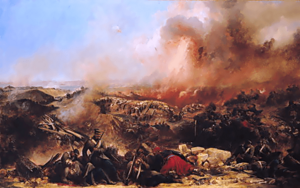William McWheeney facts for kids
Quick facts for kids
William McWheeney
|
|
|---|---|

Depiction of the Siege of Sebastopol
|
|
| Born | 1830 Bangor, County Down, United Kingdom of Great Britain and Ireland (present-day Bangor, Northern Ireland) |
| Died | 17 May 1866 (aged 35–36) Dover, Kent, England |
| Buried |
St James Cemetery, Dover
|
| Allegiance | |
| Service/ |
|
| Rank | Colour Sergeant |
| Unit | 44th (East Essex) Regiment of Foot |
| Battles/wars | Crimean War Second Anglo-Chinese War |
| Awards | Victoria Cross Distinguished Conduct Medal |
William McWheeney was a very brave soldier from Ireland. He was born in Bangor, County Down, in 1830. He is famous for receiving the Victoria Cross (VC). This is the highest award for bravery a soldier can get in the British and Commonwealth forces. He also received the Distinguished Conduct Medal (DCM). William McWheeney earned these special medals during a big war called the Crimean War.
William McWheeney: A True Hero
William McWheeney was also known as Mawhinney. He was a sergeant in the 44th (East Essex) Regiment of Foot, which was part of the British Army. He was about 23 or 24 years old when he showed amazing courage during the Siege of Sevastopol (1854–1855). This siege was a major part of the Crimean War.
His Incredible Bravery in the Crimean War
During the siege, William McWheeney volunteered to be a "sharpshooter." Sharpshooters were skilled soldiers who could shoot very accurately from a distance. He was in charge of a group of sharpshooters from his regiment.
He was always alert and active. On October 20, 1854, he showed incredible bravery. One of his team, Private John Keane, was badly wounded. This happened when the sharpshooters were forced back by many enemy soldiers. Even though there was heavy enemy fire, Sergeant McWheeney carried the wounded man on his back. He brought Private Keane to a safe place.
William McWheeney also saved the life of Corporal Courtney. Corporal Courtney was another sharpshooter who was severely wounded in the head on December 5, 1854. Sergeant McWheeney brought him out of danger. He even used his bayonet (a knife attached to a rifle) to dig a small hiding spot. They stayed there together until it was dark, then they safely left.
Later, on June 18, 1855, Sergeant McWheeney volunteered again. He joined the advanced guard of General Eyre's Brigade in the Cemetery. He was always on duty and never missed a day during the entire war.
Life After the War
William McWheeney died in Dover, England, on May 17, 1866. He was around 35 or 36 years old. He was buried in St James Cemetery in Dover.
Today, you can see his Victoria Cross medal. It is displayed at The Essex Regiment Museum in Chelmsford, England.
 | Jackie Robinson |
 | Jack Johnson |
 | Althea Gibson |
 | Arthur Ashe |
 | Muhammad Ali |

